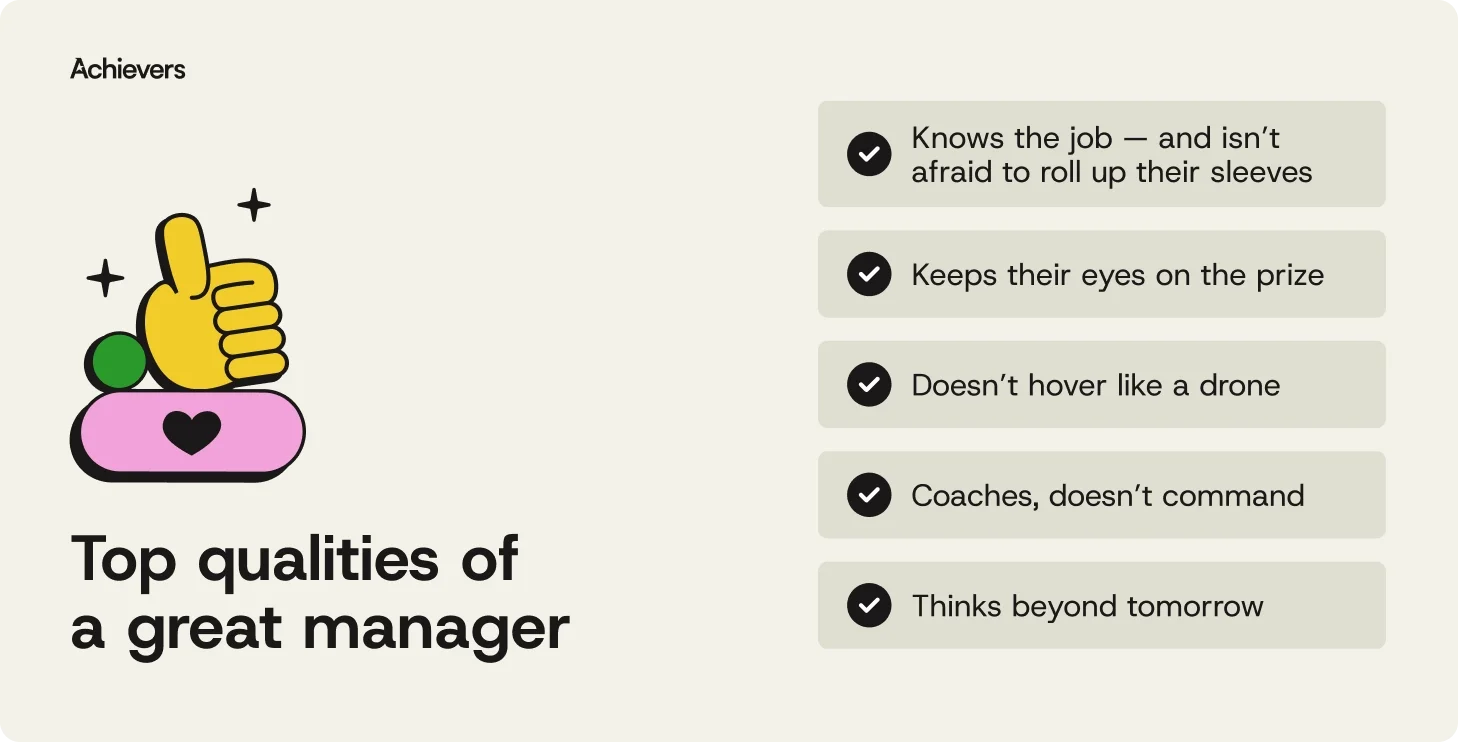Create a culture that means business™
Schedule a demo with an Achievers solution expert today.
Let’s be honest: being a great manager isn’t just about holding meetings that could’ve been emails or expertly navigating the office coffee machine. It’s about people — leading them, supporting them, and knowing when to get out of their way.
Great managers shape culture, fuel engagement, and help employees thrive — not by micromanaging, but by recognizing the value each person brings. When employees feel genuinely seen and appreciated, they feel empowered to bring their best selves to work.
In this blog, we’ll break down the 40 traits that set truly exceptional managers apart from the rest — no buzzwords, no fluff, just the good stuff. Let’s get into it.
The 40 top traits of a great manager
Being a great manager means leading with purpose, lifting others up, and creating space for people to thrive — not burn out. They coach, adapt, recognize, and build trust. Here are 40 traits that set the greats apart:

1. Knows the job — and isn’t afraid to roll up their sleeves
A great manager has the technical know-how to guide their team without getting lost in the weeds. They understand the work, offer support when needed, and earn credibility by actually knowing what they’re talking about. Wild concept, we know.
2. Keeps their eyes on the prize
Results matter — but so does how you get there. Great managers set clear goals, track progress, and push for outcomes without pushing people over the edge.
3. Doesn’t hover like a drone
Micromanaging? Hard pass. The best managers trust their team to get the job done. They offer guidance, not a play-by-play commentary, and give people the autonomy to own their work.
4. Coaches, doesn’t command
Great managers don’t just bark instructions — they build people up. They offer thoughtful feedback, share wisdom, and help employees stretch into new skills (without stretching them too thin).
5. Thinks beyond tomorrow
A strong manager sees the big picture. They have a clear vision for where the team is headed and know how to connect the dots between day-to-day tasks and larger company goals.
6. Talks and listens
Communication is more than Slack messages and status updates. Great managers clearly share expectations and feedback — and just as importantly, they actually listen to what their team has to say.
7. Brings the human side to work
Empathy isn’t just a buzzword. Managers with emotional intelligence understand what their team needs, respond with compassion, and know how to de-escalate drama without adding to it.
8. Practices what they preach
Whether it’s punctuality, professionalism, or taking PTO without guilt — great managers lead by example. They model the behaviors they want to see, making it easier for everyone else to follow suit.
9. Builds trust like it’s their job (because it is)
No one wants to work for someone who’s unpredictable or keeps secrets. Great managers build trust through honesty, clarity, and consistency — no smoke and mirrors needed.
10. Knows that recognition isn’t optional
People want to feel appreciated. Top-tier managers recognize hard work regularly, whether it’s a public shoutout, a personal thank-you, or something more formal. A little recognition goes a long way — and great managers know it.
11. Invests in your growth, not just your output
Great managers don’t just want you to hit today’s goals — they want you to grow into tomorrow’s opportunities. Whether it’s training, mentorship, or nudging you toward that stretch project, they’re all in on your development (and not just because it makes them look good).
12. Handles conflict without fueling the fire
Disagreements happen — we’re all human. But great managers don’t avoid conflict or let it fester. They step in early, stay neutral, and find solutions before things turn into a Slack cold war.
13. Doesn’t panic when things change
Markets shift, strategies evolve, and surprise! — nothing stays the same. Great managers roll with it. They keep calm, communicate clearly, and help the team navigate change without losing momentum (or their minds).
14. Knows how to rally the team
Some managers drain energy. The great ones? They bring it. They motivate with purpose, positivity, and the occasional pep talk that actually works. Your wins feel bigger because they helped you believe they were possible.
15. Actually listens — like, really listens
There’s a difference between hearing words and understanding what someone’s trying to say. Great managers listen with intent, pick up on what’s said and unsaid, and respond in ways that show they’re paying attention — no eyerolls or multitasking involved.
16. Owns their mistakes (and expects you to own yours)
Accountability isn’t about blame — it’s about standards. The best managers hold themselves and others accountable in a way that’s firm but fair. They don’t throw people under the bus — they steer the whole team in the right direction.
17. Makes fair decisions without playing favorites
Good managers know how to leave personal bias at the door. They evaluate situations objectively, make consistent decisions, and treat everyone like a valuable contributor — even the one who always forgets to mute on Zoom.
18. Welcomes big ideas (even weird ones)
Innovation thrives in safe, curious spaces. Great managers encourage creativity, ask for input, and are open to ideas that challenge the norm — because sometimes the “weird” idea is the one that works.
19. Treats time like the limited resource it is
No one wants to feel like their day was eaten alive by meetings. Great managers know how to prioritize, keep things moving, and protect the team’s time — including yours.
20. Supports work-life balance without eyeing the clock
Great managers know burnout isn’t a badge of honor. They encourage time off, flexibility in the workplace, and the radical idea that you can do great work and still have a life.
21. Has a growth mindset (and doesn’t pretend to know everything)
The best managers aren’t afraid to say “I don’t know”— because they’re always learning. They embrace change, cheer on experimentation, and model curiosity for their teams.
22. Builds a culture people actually want to be part of
Company culture isn’t free snacks and team hoodies — it’s how people treat each other when no one’s watching. Great managers foster trust, inclusion, and collaboration so the team actually works like… well, a team.
23. Knows their team’s strengths — and actually uses them
Everyone brings something unique to the table (even if it’s an alarming number of Excel shortcuts). Great managers know what makes each person tick and tailor their approach to help everyone shine.
24. Manages stress without passing it around
Deadlines, pivots, last-minute changes — stress is part of the job. But great managers keep their cool and help the team stay grounded, rather than adding fuel to the fire.
25. Makes teamwork feel like less work
When collaboration flows, work gets done better and faster. Great managers remove blockers, encourage different perspectives, and keep egos in check so the team can focus on results.
26. Has the patience of a saint (on most days)
Let’s be honest — not every moment is a teachable one. But great managers stay patient through the ups and downs, helping their teams grow without snapping a whiteboard marker in frustration.
27. Knows what actually matters — and what can wait
Endless to-do lists are real. But great managers help their teams cut through the noise, focus on impact, and avoid the “everything is urgent” trap.
28. Trusts data more than gut feelings
Smart decisions come from solid data. Great managers look at the numbers, trends, and insights to guide their choices — not just hunches or vibes.
29. Invites different perspectives (and doesn’t just nod politely)
Great managers know that innovation doesn’t come from echo chambers. They actively seek out differing viewpoints — even the ones that challenge their own — and make space for every voice at the table (not just the loudest one).
30. Builds real relationships (not just work connections)
The best managers don’t just know what you do — they know you. They take the time to build trust and rapport, which makes everything from collaboration to tough conversations a whole lot smoother.
31. Connects the day-to-day to the bigger picture
Great managers don’t let tasks become just boxes to check. They tie the team’s work to the company’s mission, helping everyone understand why what they do matters. Yes, even the spreadsheets.
32. Doesn’t miss a chance to celebrate
Recognition isn’t reserved for major milestones. Great managers find reasons to celebrate both team wins and individual progress, because a little “well done” goes a long way.
33. Builds psychological safety without the jargon
It’s not just about being “open” — it’s about creating a psychologically safe space where people can speak up, take risks, and fail without fear. Great managers make sure employees feel secure enough to bring their whole selves to work (even the weird parts).
34. Admits they don’t know everything (because no one does)
Great managers own their mistakes and stay open to learning. They lead with humility — and aren’t afraid to take advice from someone who just joined last week. Growth goes both ways.
35. Makes meetings actually matter
Great managers don’t hold meetings just because the calendar says so. They come with a purpose, keep things focused, and make sure every attendee leaves with clarity — not just calendar fatigue.
36. Fights for the team behind the scenes
The best managers advocate for their people when no one’s watching. They secure resources, push for raises, and protect the team from politics or unreasonable demands — even if it means having tough conversations with higher-ups.
37. Learns what motivates each person — then taps into it
Great managers know that not everyone is driven by the same things. They take the time to understand what lights a fire for each team member and use that knowledge to inspire without manipulating.
38. Makes onboarding feel like a welcome, not a whirlwind
Great managers don’t just hand you a laptop and wish you luck. They create structured, supportive onboarding experiences that help new team members feel confident, connected, and ready to contribute — from day one.
39. Doesn’t just lead — they develop leaders
Great managers don’t hoard leadership — they grow it. They delegate meaningfully, empower others to step up, and help future leaders gain confidence without throwing them in the deep end.
40. Sets boundaries — and respects yours
Boundaries aren’t a weakness; they’re a blueprint for sustainability. Great managers model healthy limits, discourage always-on culture, and respect the line between work and everything else.
Bringing it all together: The mark of a truly great manager
Great managers do more than hit KPIs — they turn chaos into collaboration and lead with empathy. But no one becomes a great manager alone. They need support, and that’s where Achievers helps.
With tools that recognize, reward, and engage, Achievers empowers managers to build a culture where people thrive — not out of obligation, but motivation. Because great managers don’t just manage — they make work work.



